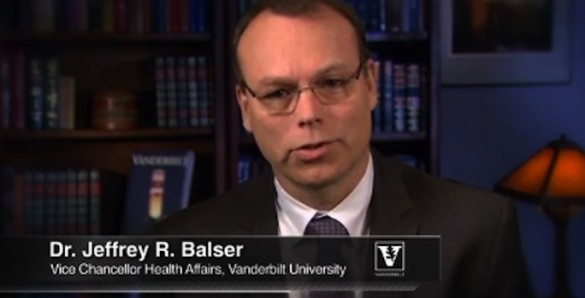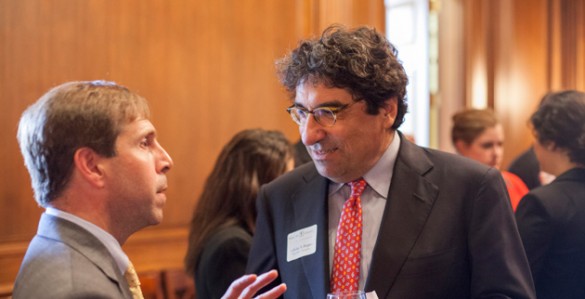Dear Medical Center Colleagues,
Last month, as the impact of federal budget sequestration (the “sequester”) became reality, I pledged to communicate with you frequently about the unprecedented financial challenges before us, and steps we must all proactively engage.

First of all, our challenges are becoming clearer. The U.S. Congress just passed a continuing resolution that avoids a shutdown of the federal government, but continues the reduced “sequester-level” funding for all key programs pivotal to VUMC, including Medicare, Medicaid and the NIH, into the coming year. In addition, we received news this past week that the State of Tennessee will not accept the conditions necessary to receive federal funds available through the Affordable Care Act (ACA) for Medicaid expansion.
While the Governor has indicated that negotiations between the federal government and Tennessee will continue, the ACA is nonetheless eliminating payments to medical centers like Vanderbilt who continue to treat a disproportionate share of the uninsured. So for the time being, Vanderbilt and Tennessee’s other safety net hospitals will be managing the growing costs of uninsured health care while receiving far less financial support than in the past.
Details surrounding reductions to our revenue streams are further elaborated in my prior communication, which included a set of Frequently Asked Questions, as well as in recent communications by Dr. Pinson about changes in the Tennessee Medicaid program, or TennCare.
I have received many thoughtful suggestions from across the Medical Center for ways to improve our cost effectiveness. Your suggestions are sincerely appreciated, and I assure you each suggestion is being given careful consideration. Many of these suggestions will help us achieve long-term cost effectiveness. However, when considered in total, the seriousness of the state and national financial circumstances outlined above also require us to take some major immediate actions to assure the Medical Center’s financial health and future.
Above all, I believe our actions, in tough times and in times of plenty, should reflect our values.
The vast majority of VUMC’s operating costs support the wages and benefits of our 20,000 incredibly hard-working faculty and staff, the very same people who sustain our culture and are our greatest asset. While we must counter these sudden, sustained reductions in revenue across multiple mission areas head-on, we must be ever mindful of the impact such actions have on our people and their families. Hence, as indicated in my prior communication, we are doing everything possible to identify cost savings that will not require reductions in pay or large-scale reductions in staffing.
Today, I’m asking for your support for a series of actions we must undertake in order to counter the revenue reductions being imposed on VUMC.
First, we need to achieve savings that will allow us to recover financial losses due to federal sequestration and other legislation prior to the end of this fiscal year, which ends June 30. We have reviewed many options that will yield the greatest cost savings without reducing direct pay.
To this end, we have already implemented a system-wide hiring freeze for all positions without direct patient care responsibility through June 30. Across VUMC, faculty and staff have been asked to minimize discretionary expenditures, including food and travel costs.
Throughout VUMC, as new vacation days are earned, federal accounting rules require the cost for these days to be set aside and treated as money “already spent.” Essentially, the Medical Center incurs the expense for vacation time as it is earned, not when vacation is taken. Hence, to avoid reductions to direct pay, Medical Center employees will not earn new vacation hours between April 1 and June 30, 2013. This will save the Medical Center nearly $12 million, approximately half of the $20 million shortfall we need to make up before June 30.
Please know these actions related to vacation hours in no way impact your ability to take vacation time you have already earned. Taking vacation you already have in your “bank” over the coming months will have no negative financial impact on VUMC. Vacation time can and should be used and scheduled in the normal manner during this period of time. There are no changes in the process for you to request vacation time through your supervisor, nor does this affect accrual of sick time.
I described in my prior communication that VUMC must identify $50 million in savings over the coming months: $20 million this fiscal year and $30 million during the next.
To assure we are on track to save an additional $30 million in the coming fiscal year, we will not plan to implement a pay increase for faculty and staff in VUMC on July 1, 2013. In addition, for members of the Medical Center’s leadership who receive a portion of their pay based on institutional performance metrics, this compensation will not be paid this year. We will constantly evaluate savings performance from a host of cost reduction activities, while continuing to brace for additional revenue reductions we will likely see over the coming months. If possible, we will implement a pay increase later in the coming fiscal year.
These actions to secure our future are absolutely essential. Failing to act aggressively and swiftly to manage our operational costs could result in serious financial consequences that would ripple across all mission areas and impact our future for years to come.
I want to thank each of you for everything you are doing to support the hiring freeze, as I know many of you are taking on extra responsibilities during this time. Importantly, many operating units are coming forward with exciting and detailed plans to integrate and share administrative support functions. Over time, I am confident these efforts will allow us to further reduce costs associated with our core missions of patient care, research and education in a sustainable manner, and allow us to continue to provide market-competitive compensation to all faculty and staff.
It is clear we are all working harder than ever. Our success in competing for research grants, applications to our educational programs in all areas, hospital admissions, clinic visits, surgical operations and emergency room visits are all performing at levels well above the prior fiscal year. The enthusiasm of students, patients, media, foundations and other external agencies for VUMC, in all of its missions, has never been greater. As I have said before, our challenge is not one of productivity or excellence in performance; rather, like all academic medical centers, we are now facing unprecedented, dramatic reductions to payments for core mission activities from a host of government agencies.
While painful, our cost reduction measures are prudent and will allow us to move forward while minimizing the need for additional measures that could adversely affect the financial circumstances of our greatest asset, our people. As we continue to carefully monitor our finances, with these decisive actions I am confident and optimistic about our future.
What can you continue to do to help? If you have suggestions for cost savings please notify your manager or send your suggestions here. Your input is greatly appreciated.
I remain grateful to be a part of such a caring community that has a palpable impact on the lives of Tennesseans and on people all around the world. Your continued support during this period of unprecedented financial stress to our core missions of health care and biomedical science is deeply appreciated.
Sincerely,
Jeff Balser, M.D., Ph.D.
Vice Chancellor for Health Affairs
Dean, School of Medicine















